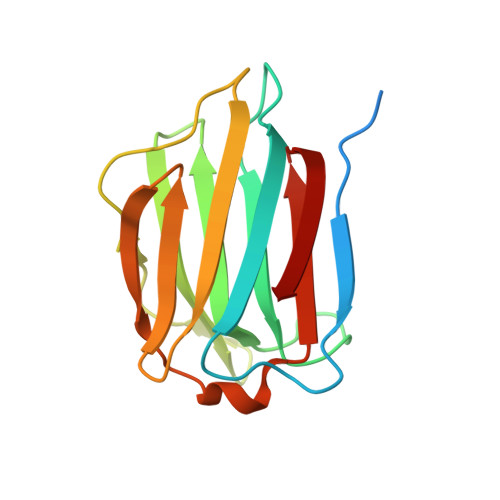Dual thio-digalactoside-binding modes of human galectins as the structural basis for the design of potent and selective inhibitors
Hsieh, T.J., Lin, H.Y., Tu, Z., Lin, T.C., Wu, S.C., Tseng, Y.Y., Liu, F.T., Danny Hsu, S.T., Lin, C.H.(2016) Sci Rep 6: 29457-29457
- PubMed: 27416897
- DOI: https://doi.org/10.1038/srep29457
- Primary Citation of Related Structures:
4Y24, 5H9P, 5H9Q, 5H9R, 5H9S - PubMed Abstract:
Human galectins are promising targets for cancer immunotherapeutic and fibrotic disease-related drugs. We report herein the binding interactions of three thio-digalactosides (TDGs) including TDG itself, TD139 (3,3'-deoxy-3,3'-bis-(4-[m-fluorophenyl]-1H-1,2,3-triazol-1-yl)-thio-digalactoside, recently approved for the treatment of idiopathic pulmonary fibrosis), and TAZTDG (3-deoxy-3-(4-[m-fluorophenyl]-1H-1,2,3-triazol-1-yl)-thio-digalactoside) with human galectins-1, -3 and -7 as assessed by X-ray crystallography, isothermal titration calorimetry and NMR spectroscopy. Five binding subsites (A-E) make up the carbohydrate-recognition domains of these galectins. We identified novel interactions between an arginine within subsite E of the galectins and an arene group in the ligands. In addition to the interactions contributed by the galactosyl sugar residues bound at subsites C and D, the fluorophenyl group of TAZTDG preferentially bound to subsite B in galectin-3, whereas the same group favored binding at subsite E in galectins-1 and -7. The characterised dual binding modes demonstrate how binding potency, reported as decreased Kd values of the TDG inhibitors from μM to nM, is improved and also offer insights to development of selective inhibitors for individual galectins.
- Institute of Biological Chemistry, Academia Sinica, Taipei, 11529, Taiwan.
Organizational Affiliation:

















